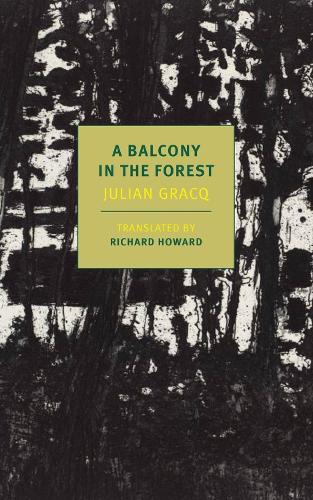
A Balcony In The Forest
(Paperback, Main)
Publishing Details
A Balcony In The Forest
By (Author) Julien Gracq
By (author) Richard Howard
New York Review Books
NYRB Classics
15th December 2017
11th January 2018
Main
United States
Classifications
General
Fiction
Fiction: literary and general non-genre
War, combat and military adventure fiction
843.914
Physical Properties
Paperback
232
Width 128mm, Height 203mm, Spine 13mm
240g
Description
It is the fall of 1939, and Lieutenant Grange and his men are living in a chalet above a concrete bunker deep in the Ardennes forest, charged with defending the French-Belgian border against the Germans in a war that seems unreal, distant, and unlikely. Far more immediate is the earthy life of the forest itself and the deep sensations of childhood it recalls from Grange's memory. Ostensibly readying for war, Grange instead spends his time observing the change in seasons, falling in love with a young free-spirited widow named Mona, and contemplating the absurd stasis of his present condition. This novel of long takes, dream states, and little dramatic action culminates abruptly in battle, an event that is as much the real incursion of the German army into France as it is the sudden intrusion of death into the suspended disbelief of life. Richard Howard's skilled translation captures the fairy-tale delicacy and existential dread of this unusual, elusive novel (first published in 1959) by the supreme prose stylist Julian Gracq. Story Locale- France and Belgium
Reviews
"Richard Howards sinuous translation...is from 1959 but feels perfectly up-to-date...The war arrives in this unexpectedly delicate story with the shadowy unreality of a dream...but it is a dream of a vastly different nature. Sam Sacks,The Wall Street Journal
A Balcony in the Forestpresents Granges fantasies in prose that is lyric, yet precise; Richard Howards translation of 1959 still seems fresh. Nick Holdstock,TLS
Only one writer could give expression to the venomous poetry of those months of watching and waiting, of waking dreams, and that was Julien Gracq.Claude Roy, Libration
One of the very few first-class novels about the 1939 war that I have ever read.Norman Shrapnel, The Guardian
His precise, meticulous descriptions are entrancing. A work at once powerful and delicate.
Maurice Nadeau, Observateur
Balcony in the Forest is not a war novel, although it describes the experiences of Frenchmen in uniform during the early days of World War II. Julien Gracq has written a sensitive and analytical study of men enmeshed in a phony wara war that would ultimately result in the tragic, dramatic fall of France.... The facile pen of the author is evident on every page, especially in the descriptive passages of the phantom forest, the seasonal landscape colors, and the beauty of nature in contrast with mans destructiveness in wartime. These descriptions sing in the exceptionally smooth translation by Richard Howard, who, like the writer Julien Gracq, reveals a poetic sense throughout this cogitative novel. Max Bogart, The Saturday Review
A series of brilliantly written descriptions of the Forest of Ardennes, the winter of the phony war and of what it is like to be a soldier in a blockhouse there, waiting for a war one does not really expect to come. Kirkus Reviews
Balcony in the Forest is a strange, elusive novel. Is Grange an unrealistic dreamer who takes refuge from the realities of war in the dream forests of childhood fairy tales Or is he tapping into some primal force or existential plane that transcends the pettiness of human history Vertigo (blog)
The translation, by Mr. Richard Howard, is worthy of a book whose force depends almost entirely on the quality of its writing. The Times Literary Supplement
A most pleasing novel. Written in a prose that avoids all eccentricities and experiments, it moves rapidly and smoothly because each word seems exactly the one required. New York Herald Tribune
Author Bio
Julien Gracq (1910-2007), whose real name was Louis Poirier, was a French geographer and historian, and the author of four novels, poetry, and a play. His work was influenced by surrealism, and he dedicated his first novel, The Castle of Argol, to Andre Breton. In 1951 he won the Prix Goncourt for his third and best-known novel, The Opposing Shore (though he refused to accept the prize). He taught at Lycee Claude-Bernard for twenty-three years. Richard Howard is the author of seventeen volumes of poetry and has published more than one hundred and fifty translations from the French, including, for NYRB, Marc Fumaroli's When the World Spoke French, Balzac's Unknown Masterpiece, and Maupassant's Alien Hearts and Like Death. He is a National Book Award and Pulitzer Prize winner. He lives in New York City.
